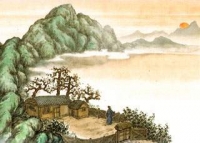On the Mountain Holiday Thinking of my Brothers in Shandong
Mount Zhongnan
Seeing Off a Friend
Lodge Among the Bamboos
Deer-park Hermitage
Bird Stream
AT PARTING
TO QIWU QIAN BOUND HOME AFTER FAILING IN AN EXAMINATION
A GREEN STREAM
A FARM-HOUSE ON THE WEI RIVER
THE BEAUTIFUL XI SHI
A Song of a Girl from Loyang
Song of an Old General
A Song of Peach-blossom River
A Message from my Lodge at Wangchuan to Pei Di
An Autumn Evening in the Mountains
Bound Home to Mount Song
Answering Vice-prefect Zhang
Toward the Temple of Heaped Fragrance
A Message to Commissioner Li at Zizhou
A View of the Han River
My Retreat at Mount Zhongnan
An Early Audience at the Palace of Light Harmonizing Secretary Jia Zhi Poem
Looking Down in a Spring-rain on the Course from Fairy-mountain Palace to the Pavilion of Increase Harmonizing the Emperor's Poem
| Multiple poems at a time |
A Parting
山中送别
Wang Wei
Friend, I have watched you down the mountain
Till now in the dark I close my thatch door....
Grasses return again green in the spring,
But O my Prince of Friends, do you?
Translator: Witter Bynner
【Collections】唐诗300首
Edited by: 戴玨
